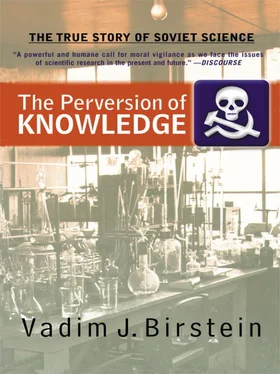
The main building of the Presidium of the Soviet Academy of Sciences (from 1934 on), as it looked in the 1950s. Annual meetings of the academy took place in this eighteenth-century palace. (Photo from the Russian State Archive of Cinema and Photo Documents [Moscow])
Koltsov was also attacked by Communist Party members in his own institute. At an institute meeting on January 15, 1939, one of his most talented pupils, Nikolai Dubinin, accused Koltsov of supposedly racist and Fascist views because in the 1920s, Koltsov had been an enthusiastic supporter of eugenics (which meant simply human genetics in Russia in the 1920s). As Dubinin recalled later, Koltsov responded that “he did not take back a single word he had ever spoken about genetics.” 40However, the resolution of the meeting was in support of Koltsov, and it said that the article in Pravda signed by Academician Bach and others “gave a wrong image of N. K. Koltsov as a scientist and a citizen.” 41This was almost an uprising against “the Party line”! Of course, the problem was not Koltsov’s scientific opinions but his independence and the impossibility of controlling him and his institute ideologically.
A special commission was sent to Koltsov’s institute. It included Academician Lysenko, newly elected, as well as Academician Bach and one of Mairanovsky’s supporters, Academician Grashchenkov. As a result of the commission’s “inspection,” Koltsov lost his institute. On June 3, 1939, Koltsov, one of the best biologists of the twentieth century, begged his colleague and old friend, Secretary Academician Leon Orbeli:
It seems that I will not be pushed out from my apartment and my small laboratory room (both are completely separated from the other rooms of the same building of the Institute)…. Do I still have a salary? Will my wife, M. P. Koltsova (Doctor of Biological Sciences), and my personal technician, E. P. Kumakova, be allowed to continue to work with me? How will we be paid and funded (I need very small sums for experiments which I can cover from my salary)? I would prefer to receive this money from the Academy, but if this is not possible, you can attach my small laboratory (three persons) to any institute within the Academy… 42
Koltsov died of a heart attack on December 2, 1940, in Leningrad, where he arrived with his wife, Maria Sadovnikova-Koltsova, to give a lecture. The same night, his wife (who was also his research assistant) committed suicide. 43She left a letter to colleagues at the Institute of Experimental Biology. In it, she cited the last words of Koltsov. Before he died, Koltsov suddenly opened his eyes and said: “I would like everything and everybody to wake up.” He definitely meant the nightmare with his institute, Lysenko, and the whole regime. Koltsov and his wife were buried together in the same grave at Vvedenskoe Cemetery in Moscow.
In 1940, Koltsov’s institute was transferred from the Commissariat of Health to the Academy of Sciences and renamed the Institute of Histology, Cytology, and Embryology (now Severtsov Institute of Ecology and Evolutionary Problems of the Russian Academy of Sciences). The histologist Georgii Khrushchov, quite loyal to Lysenko, was appointed director of the renamed institute. Only in 1967, one of Koltsov’s devoted pupils, Boris Astaurov, managed to create the Koltsov Institute of Developmental Biology within the academy, which to some extent continued Koltsov’s tradition in science.
Lev Berg became an academician in 1946. After 1939, he was nominated again for the elections in 1943 and 1946. In 1946, Berg was recommended for the geography (and not the biology) branch of the academy. The second nominee for the same position, Dr. Baransky, refused to compete with Berg. In a letter addressed to the Academy Presidium, he wrote: “No one can be an Academician if Berg isn’t one.” 44Berg was elected.
After Koltsov’s death, censors struck his name from all Soviet scientific literature for the following twenty-five years. Lysenkoists sometimes mentioned Koltsov as the author of “the most reactionary and insane delirium.” 45Generations of Soviet biologists never heard the name of this brilliant zoologist, geneticist, and evolutionist. However, Koltsov at least died a free man. The second major enemy of the “people’s scientist” (as Lysenko was known in the Soviet press), Academician Nikolai Vavilov, died in the hands of the NKVD. Lysenko himself denounced Vavilov to the secret service.
PROTESTORS OF THE 1930s–1940s: VAVILOV AND PRYANISHNIKOV
Every time he [Nikolai Vavilov] was brought in, Khvat [the NKVD investigator] asked him the same question:
“Who are you?”
“I am Academician Vavilov.”
“You’re a load of shit and not an Academician.”
—M. Popovsky,
The Vavilov Affair
As one can see from the investigation materials, they [the geneticist Grigory Levitsky and botanist Konstantin Flyaksberger] were arrested [in 1941] in fact because of their sharp criticism of Lysenko and because of their belief (which they announced at a meeting of the Institute’s Scientific Council) that one should not support scientific theories by political slogans.
—Senior prosecutor of the Leningrad Region I. V. Katukova 46
From the 1920s–1950s, one needed to have courage to withstand the ideological pressure of the Soviet state and to retain one’s scientific and human beliefs. Biologists could be punished for two “crimes”—nonacceptance of Lysenko’s doctrine and protests against the arrests of colleagues. The second was especially dangerous.
Before he was arrested in 1940, Nikolai Vavilov had tried to help those members of his institute’s staff who had been arrested (at least eighteen had been arrested between 1934 and 1940) by sending letters to various state departments and approaching the head of the Leningrad NKVD. 47Vavilov, one of the most talented botanists and geneticists of the twentieth century, was well known in the international scientific community for his discoveries of the law of homologous series in hereditary variation 48and of centers of origin of cultivated plants. 49In 1924, he created the All-Union Institute of Applied Botany and New Cultures in Leningrad, which in 1930 was renamed the All-Union Institute of Plant Breeding (VIR). 50Vavilov was director of the VIR until his arrest in 1940. Also, in 1929 he formed the All-Union Academy of Agricultural Sciences (VASKhNIL). He served as president of VASKhNIL until 1935, when Vavilov was replaced by Aleksandr Muralov and then Lysenko. From 1930 until 1940, Vavilov also headed the Academy Institute of Genetics.
Vavilov tried to defend colleagues who had been arrested by the OGPU-NKVD even during the early 1930s. He wrote letters in defense of forty-four arrested agricultural colleagues and, in 1934, on the behalf of two arrested scientists, V. M. Kreps and Sergei Sobolev. 51When Vavilov himself was arrested, four members of the institute staff, Drs. Nina Bazilevskaya, Nikolai Kovalev, Maria Rozanova, and Yelena Stoletova, wrote letters to the Central Committee of the Bolshevik (Communist) Party and the NKVD defending him. 52Due to the political atmosphere of the time, this was almost suicidal. But these scientists could not stay silent.
During the 1990s, the FSB allowed Nikolai Vavilov’s son, the physicist Yurii Vavilov, and the historian Yakov Rokityansky to look through Vavilov’s Investigation File of Case No. 1,500 and some other files that contained materials regarding Vavilov. Yurii Vavilov and Rokityansky published several documents declassified by the FSB. 53They included more documents in the book A Trial of an Executioner: Nikolai Vavilov in the Torture Chamber of the NKVD. A Biographical Sketch. Documents, which was published in Russian in 1999. 54Together with the materials published earlier by Mark Popovsky in his book The Vavilov Affair , these documents provide a unique opportunity to recreate Vavilov’s fate in the hands of the NKVD. This is the only case where almost complete NKVD/NKGB investigation documents on a Soviet political prisoner have been released to the public.
Читать дальше












